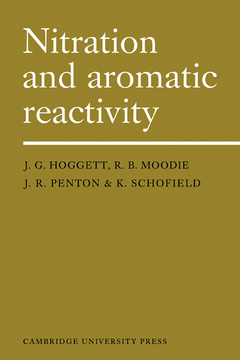Description
Nitration and Aromatic Reactivity
Authors: Hoggett J. G., Moodie R. B., Penton J. R., Schofield K.
First published in 1971 this volume claims that nitration is important because it is the most general process for the preparation of aromatic nitro-compounds.
Language: English
Subject for Nitration and Aromatic Reactivity:
Approximative price 37.68 €
Subject to availability at the publisher.
Add to cart
Publication date: 03-2009
256 p. · 15.2x22.9 cm · Paperback
256 p. · 15.2x22.9 cm · Paperback
Description
/li>Contents
/li>
First published in 1971 this volume claims that nitration is important for two reasons. First, because it is the most general process for the preparation of aromatic nitro-compounds, and secondly, on account of the part it has played in the development of theoretical organic chemistry. The special concern of this monograph is with those nitrating systems in which mechanistic studies have established, or made probable, the identity of the agent through which they effect nitration. It presents a summary of the understanding of the nitration process. A discussion of the various types of nitrating systems leads to the conclusion that nitration is generally effected through the nitronium ion. The mechanism of the substitution is examined, and discussed in terms of reactivity for particular groups of aromatic compounds.
1. Introduction; 2. Nitrating systems: A. mineral acids; 3. Nitrating systems: B. inert organic solvents; 4. Nitrating systems: C. miscellaneous; 5. Nitrating Systems: D. benzoyl nitrate and systems formed from nitric acid and acetic anhydride; 6. The process of substitution; 7. Nitration and aromatic reactivity: A. The theoretical background; 8. Nitration and aromatic reactivity: B. The nitration of bases; 9. Nitration and aromatic reactivity: C. The nitration of monocyclic compounds; 10. Nitration and aromatic reactivity: D. the nitration of bi and poly-cyclic compounds.
© 2024 LAVOISIER S.A.S.
These books may interest you

Advances in Heterocyclic Chemistry 203.23 €


